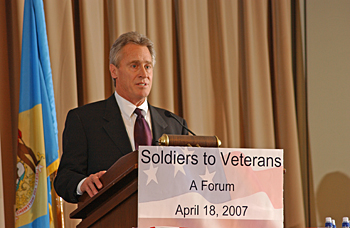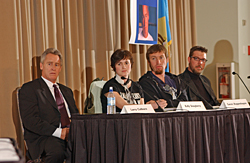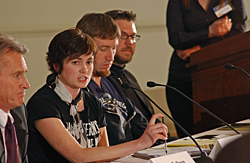
These highly charged issues were among the topics addressed during “Soldiers to Veterans: Burdens of Conscience and a Careless Public from Vietnam to Iraq,” a forum held April 18 in Clayton Hall.
About 300 members of the UD and general community, including veterans of both the Persian Gulf War, the current war in Iraq and the Vietnam War, turned out for the event. The forum honored the memory of the late Hugh Thompson, the U.S. Army helicopter pilot who rescued Vietnamese civilians during the infamous 1968 My Lai Massacre in which American troops killed 504 unarmed civilians.
Participants in the panel discussion included Larry Colburn, who as a gunner aboard Thompson's chopper also helped to stop the My Lai Massacre. Joining Colburn were Kelly Dougherty, Garett Reppenhagen and Jimmy Massey, all members of the Iraq Veterans Against the War (IVAW).
Student panelists included Kira Mineroff, a senior majoring in history, economics, legal studies and philosophy; Joseph Dewson, a Marine corporal and Iraq War veteran; and James Ferguson, a Marine officer candidate and senior political science and international relations major. Alexis Erwin, a senior in the College of Arts and Sciences, was the moderator.
Guy Alchon, associate professor of history and organizer of the forum, opened the event with an Empty Chair ceremony in which an American flag was draped over an empty chair on the stage while UD students read the names of 22 deceased veterans from the First State who served in Iraq and Vietnam.
“We live in an age that has lost the art of political argument, that collapses the public into the personal, and all too easily makes it impossible to speak strongly, but impersonally with one another for fear of hurting that person's feelings,” Alchon said. “This forum stands against that. Above all is the insistence that we must all accept, and that we owe each other this simple maxim, 'To disagree, without being disagreeable.'”
After a screening of excerpts from Back to My Lai and The Ground Truth, Colburn remembered the courage of Thompson, and called on the audience to demand that politicians use war as the final and not the first option in settling international conflicts.

Massey, a 12-year veteran of the U.S. Marines, who served in Iraq with the 7th Marines during the 2003 invasion, said one of the “hardest parts of war is that you visually see the effects it has on the civilian population. It feels like your heart is being ripped out of your chest every time you see an innocent person die because of the war machine.”
Reppenhagen, the son of a Vietnam veteran, was deployed on a nine-month peacekeeping mission in Kosovo, and served as a sniper/scout in and around Baquabah, about 30 miles northeast of Baghdad, from February 2004 to February 2005. Like many Iraq veterans, Reppenhagen's military service was extended for an additional 10 months.
Reppenhagen said his experiences in Iraq led him to believe that the Iraqis had come to see the American presence as an unwelcome occupation.
After asking the audience to recognize all the veterans in the audience, Reppenhagen said it is the responsibility of all civilians to make sure that political leaders use the military in a responsible manner and to provide the proper support for those injured as a result of their military service.
“When all peaceful means to a conflict have been exhausted, that is when we use military power. When the government does not do so, we have to hold them accountable. It is mandatory. It is our duty as citizens,” Reppenhgen said. “Somehow, some way, we have fallen asleep. Our country knows how to create veterans, but we don't know how to take care of them.”
Dougherty, who served in the Iraq from February 2003 to February 2004, was a cofounder of the Iraq Veterans Against the War, and currently serves as the organization's executive director.
“The war in Iraq is not like what you see on television,” Dougherty said. “The true story is not being told of the impact of the war on the Iraqi people.”

While thanking the panel of military vets for their service to America, senior James Ferguson took issue with the views expressed and said that the country's mission is just and that failure to stay the course would be a disaster.
“The suggestion that the United States is the problem does a disservice to those who have given their lives,” Ferguson said. “I say that our armed forces are the best hope of the Iraqi people. How would it be if we leave Iraq and it becomes a base for international terrorism?”
After the remarks by student and military panelists, members of the audience were encouraged to state their views and to question members of the panel on the positions they had expressed on the issue of American involvement and possible withdrawal from the conflict in Iraq.
The event was cosponsored by the departments of history, political science, the University Honors Program and Pi Kappa Phi.
Article by Jerry Rhodes
Photos by Duane Perry


